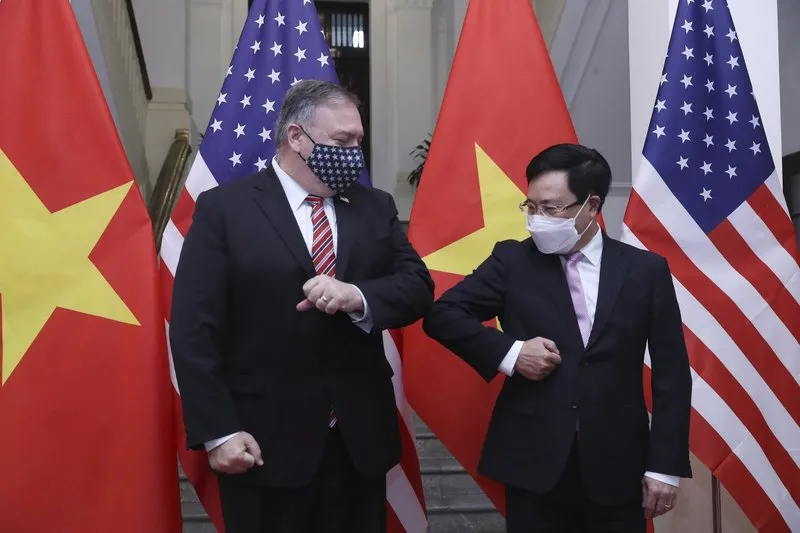
The United States Secretary of State, Mike Pompeo recently embarked on a
five nation Asia tour to India, Sri Lanka, Maldives, Indonesia and Vietnam from October 25 to 30, 2020 as the US presidential election looms. Calling out the growing Chinese threat has been the predominant theme in President Donald Trump’s election campaign. Following on those lines, Secretary of State, Mike Pompeo during his visits repeatedly spoke of the need for cooperating with the United States in confronting the security threats posed by China in the Indo-Pacific region. For the Southeast Asian leg of the tour, Secretary Pompeo like the Japanese Prime Minister, Yoshihide Suga chose to visit Jakarta and Hanoi. Prime Minister Suga too for his
first overseas trip visited Indonesia and Vietnam as a part of his four-day trip to Southeast Asia. Upholding the “ASEAN centrality” has been an important tenet in the Free and Open Indo-Pacific (FOIP) vision of all the four democracies, India, Japan, US and Australia who have been the most active voice of this vision. In the second Quadrilateral Ministerial meeting held in Tokyo in October 2020 as well ‘ASEAN centrality’ was repeatedly referred to as a primary facet of the FOIP policy. In Southeast Asia, Indonesia and Vietnam have been the leading nations to embrace the FOIP vision and it was Jakarta which pushed for an inclusive ASEAN centric outlook on the Indo-Pacific. Besides this, Indonesia is considered the
primes inter pares in the ASEAN and has always attempted to play the role of a leader within the ASEAN. Indonesia’s leading role in the organisation has been recognised by the fellow member nations as well. As for Vietnam, it is currently the chair of the ASEAN and has been the most vocal among the claimant countries in pointing to the escalating tensions in the South China Sea.
During his visit to Jakarta and Hanoi, Secretary of State, Pompeo
targeted the Chinese aggressiveness in the South China Sea, where it has advanced maritime and territorial claims overshadowing the objections raised by the other claimant countries, and over its handling of the coronavirus pandemic. The main focus of this visit was hurling criticisms at China and pushing the ‘anti-China’ message. The question that arises is will this ‘anti-China’ message fair well for the US in Southeast Asia? Is this working in the favour of the US in Southeast Asia? In July 2020, the US had released a statement which showcased a shift in its stand, from a position of neutrality with regard to the sovereignty claims to
openly stating “Beijing’s claims to offshore resources across most of the South China Sea are completely unlawful, as is its campaign of bullying to control them.” Besides Vietnam, this statement of the US only raised scepticism in the other Southeast Asian countries about being caught in between this great power competition in case of a US-China conflict in the disputed waters. Therefore, even if this ‘anti-China’ messaging might have been received in a positive light in Vietnam, the same cannot be said about Indonesia. The differing attitude towards China is what is raising doubts in the minds of many about the sustenance of ‘ASEAN centrality’ and the ‘ASEAN Way’.
Though, Indonesia has constantly turned away Chinese coast guard and fishing vessels that have entered the North Natuna Sea, but Indonesia has always followed a ‘free and independent’ (
bebas- aktif) foreign policy stance. As has been
said by Rizal Sukma, Indonesian Ambassador to the United Kingdom, Ireland and the International Maritime Organisation, “The foundation of our foreign policy is given. Indonesia will never deviate from the key principles of foreign policy. Those principles oblige the country to conduct a foreign policy that upholds the
bebas-aktif (free and active) principle and plays a role as an active participant in pursuing international peace. No administration in Indonesia can afford to depart from these key and fundamental requirements.” So even though Indonesia recognises the ‘China threat’, still Indonesia will not cross the line whereby it will like the US impinge on a confrontational policy towards China. Although sharing the same position in opposing China’s maritime claims, Indonesian officials have
expressed “concern about Washington’s strident anti-China policies and rhetoric.” Indonesia will not want to choose sides in this great power turf and would actively try to create conditions that would still ensure their strategic autonomy.
Indonesian President, Joko Widodo (Jokowi) have always been more concerned about boosting economic cooperation with other countries- therefore drawing investments has been the main aim of President Jokowi’s foreign policy and overseas meetings. Indonesia’s economic ties with China have further strengthened at a time when Washington has considered downgrading Indonesia’s preferential trade treatment under the Generalized System of Preferences (GSP). Foreign Minister Marsudi has hence
stressed in her meeting with Secretary Pompeo that, “Indonesia wants economic cooperation between the two countries increasing in the future, including extension of GSP facilities for Indonesia.” Even when it comes to seeking cooperation from the US in dealing with China in the Natuna Sea, Indonesia is
seeking to invite the US to invest in the development of Riau Islands’ Natuna regency, which is a part of Indonesia’s outer islands in the southern part of the contested South China Sea.
Jakarta is aware that it needs to engage with the key powers in the region for the construction of an Indo-Pacific outlook and thus both Foreign Minister, Retno Marsudi and the Defence Minister, Prabowo Subianto during his visit to Washington DC on October 16 2020 espoused on the need to strengthen the bilateral relationship with the US in many sectors and especially in the field of maritime and defence security cooperation by boosting military procurement, training and exercises, intelligence sharing. Still Indonesia recently
rejected a U.S. request for landing and refuelling rights in Indonesia for its P-8 Poseidon maritime patrol aircraft that monitor China’s military activity. This again is a proof of Indonesia’s long-standing foreign policy approach of ‘neutrality’ and also the country has never been receptive of the idea of foreign military operating in its sovereign waters. There has been growing strategic affinity between the U.S. and Southeast Asian states in curbing China’s territorial ambitions as is seen from the recent use by the US of its military bases in Singapore, the Philippines and Malaysia to operate P-8 flights over the South China Sea, increase in the number of Freedom of Navigation operations, submarine deployments and surveillance flights. But according to Dino Patti Djalal, a former Indonesian ambassador to the United States, “the very aggressive anti-China policy of the U.S. had unnerved Indonesia and the region.”
The foreign policy approaches and principles of countries like Indonesia, Vietnam are not the same. This is reflective in President Jokowi’s
comment of the requirement for the US government to “understand Southeast Asia and Southeast Asian countries so as to create peace, stability and cooperation in the region”. The main concern in Vietnam currently is the South China Sea dispute. Thereby, Vietnam from the beginning been more open to the idea of the US FONOPs in comparison to the other claimant countries. But at the same time, Vietnal has also refrained from directly calling out China while talking about the need for ensuring a rules based and peaceful regional order during this meeting- Vietnamese Prime Minister Nguyen Xuan Phuc
stated that Vietnam looks forward to “sincere cooperation in support of a peaceful region and progress in trade and investment ties.” Jakarta on the other hand has only recently officially declared itself as a claimant country in this South China Sea scramble. Indonesia’s policy will be to strike a “balanced engagement” with the US, China, Japan, South Korea, Russia, India, Australia. This is very much clear in the statement of Foreign Minister, Marsudi after the meeting with Secretary Pompeo, where she
emphasized, “the need to pursue inclusive cooperation amidst this challenging time and underlined the need for every country to be part of the solution in the collective contribution towards world peace, stability and prosperity.” The diversity of the Southeast region and the fact that there cannot be one uniform policy for the entire region needs to be recognised by the US government. But it can be clearly seen that the Trump administration’s ‘China Policy’ will not bode well for the ASEAN region.
The views expressed above belong to the author(s). ORF research and analyses now available on Telegram! Click here to access our curated content — blogs, longforms and interviews.



 The United States Secretary of State, Mike Pompeo recently embarked on a
The United States Secretary of State, Mike Pompeo recently embarked on a  PREV
PREV


